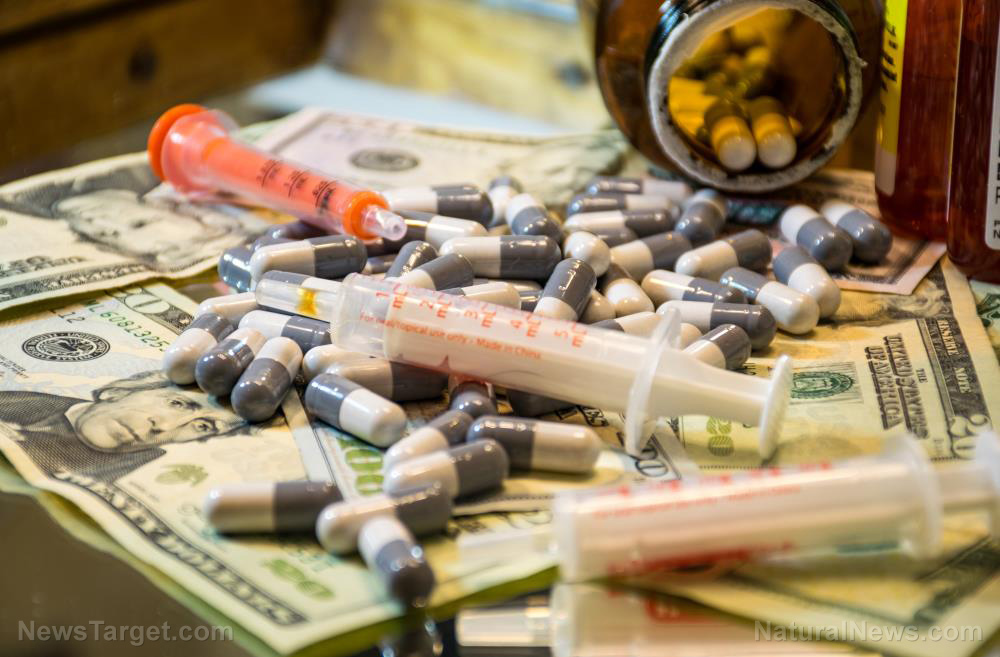Doctor says US “wasting money” on coronavirus drug from Merck
06/25/2021 / By Ramon Tomey

A critical care doctor said the U.S. is wasting taxpayer’s money on its purchase of drug manufacturer Merck’s Wuhan coronavirus (COVID-19) antiviral treatment. Front Line COVID-19 Critical Care Alliance (FLCCC) President Dr. Pierre Kory warned that the Biden administration should not pay Merck for a COVID-19 drug “which has already failed in hospitalized patients.” He instead called for the “low-cost, safe [and] widely available” ivermectin to be used with its track record of effectiveness against the disease.
Kory’s remarks came as the Department of Health and Human Services (HHS) announced on June 9 that the federal government and Merck sealed a $1.2 billion deal. Under the agreement, the drug firm will supply 1.7 million course of its molnupiravir COVID-19 antiviral drug – pending the green light by the Food and Drug Administration (FDA).
Also called MK-4482, molnupiravir is an oral medication developed in partnership with Miami-based Ridgeback Biotherapeutics. According to a statement by Merck, MK-4482 can inhibit “the replication of multiple RNA viruses, including SARS-CoV-2.” It added that the drug has “shown to be active in several models of SARS-CoV-2, including for prophylaxis, treatment and prevention of transmission.”
Currently, the drug’s efficacy is being examined in an ongoing phase three trial – with 1,850 non-hospitalized patients with mild to moderate COVID-19 on board. A previous phase three trial for hospitalized patients was aborted after phase two trial findings showed molnupiravir failing to show any clinical benefit.
Kory said in a June 14 video that the federal government should not “enrich Merck for a drug … which has already failed in hospitalized patients,” referencing MK-4482’s phase two trial. “[Yet] we plan on giving money to a drug company for [something] that is in no way going to surpass what we already have available right now. That money should instead be given to supply ivermectin to the country,” he added.
Interestingly, Merck developed ivermectin back in the 1980s with a patent that lasted until 1996. In February 2021, the drug company released a statement warning against the use of ivermectin against COVID-19. According to Merck, available data did not support the efficacy and safety of ivermectin beyond the FDA’s original purpose of approving the drug.
But Kory denounced the “untrue” statement on ivermectin, saying that it “hurts patients.” He continued: “[Merck] even called into question the safety of one of the safest drugs known in history. The statement was a lie … and it’s hurting patients and it’s caused an incalculable loss of life.” Meanwhile, Merck and the HHS did not respond to requests for comment.
The positive effects of ivermectin against COVID-19 threaten Big Pharma
If molnuvirapir gets the green light from the FDA, it will be second approved antiviral treatment for COVID-19. Back in October 2020, the U.S. regulator approved Gilead Sciences’s remdesivir for hospitalized patients.
However, the FDA recorded twice the amount of adverse events and more than four times the amount of fatalities stemming from remdesivir vis-à-vis ivermectin.
The FDA Adverse Events Reporting System (FAERS) noted that more than 4,000 reports of serious adverse events and 1,390 deaths from remdesivir were reported as of March 31, 2021. Meanwhile, about 2,311 serious adverse reactions and 373 deaths from ivermectin were recorded in FAERS for a 25-year period between 1996 and March of this year.
First approved as an anti-parasitic drug for animals in 1981, ivermectin saw widespread use in humans six years later. It was used to treat river blindness, scabies and head lice – which gained it a position on the World Health Organization‘s (WHO) list of essential medicines. The FDA has not approved ivermectin for use against COVID-19 because it is not an antiviral drug, a sentiment shared by the WHO.
But recent evidence showing the effectiveness of ivermectin against the Wuhan coronavirus has surfaced. Data from more than 30 randomized controlled trials showed an overall 64 percent improvement in prophylaxis and in all stages of COVID-19 in patients given the medication. Further studies explained that ivermectin stops the replication of SARS-CoV-2 and suppresses inflammation through its antiviral and anti-inflammatory mechanisms.
This positive result prompted FLCCC members to incorporate ivermectin in October 2020 as a core medication in their “protocols for the prevention and treatment of COVID-19.” According to Kory, areas that have adopted ivermectin into their COVID-19 treatment programs saw their case numbers and hospitalizations drop.
Mexico City is one such area that incorporated ivermectin in its COVID-19 response. A report by Trial Site News said the capital of Mexico distributed almost 80,000 ivermectin kits to people who tested positive for COVID-19 between November 2020 and January 2021. The kits were part of a home care program for Mexicans who wanted to take the medication.
The news outlets said that hospitalization rates dropped up to 76 percent in those who took ivermectin. Mexico City Mayor Claudia Sheinbaum lauded the positive results of the ivermectin home care program at a Jan. 22 live press conference. Following the promising outcomes at the capital, Mexico began distributing ivermectin kits nationwide despite the WHO advising against it.
Visit BigPharmaNews.com to read more articles about Big Pharma suppressing ivermectin as a COVID-19 treatment.
Sources include:
Tagged Under: antiviral drug, Big Pharma, conspiracy, coronavirus treatment, covid-19 pandemic, Food and Drug Administration, ivermectin, medical censorship, Merck, molnupiravir, remdesivir, Wuhan coronavirus
RECENT NEWS & ARTICLES
COPYRIGHT © 2020 medicalcensorship.com
All content posted on this site is protected under Free Speech. medicalcensorship.com is not responsible for content written by contributing authors. The information on this site is provided for educational and entertainment purposes only. It is not intended as a substitute for professional advice of any kind. medicalcensorship.com assumes no responsibility for the use or misuse of this material. All trademarks, registered trademarks and service marks mentioned on this site are the property of their respective owners.



















